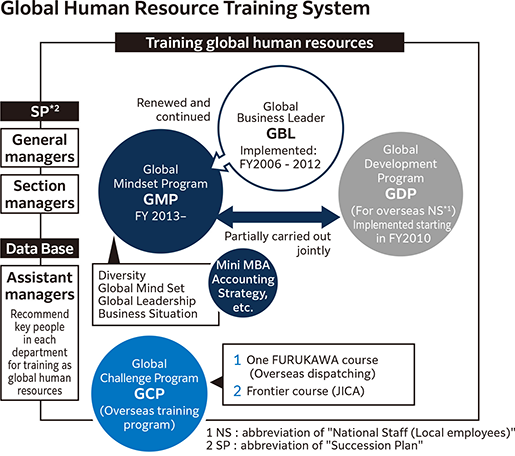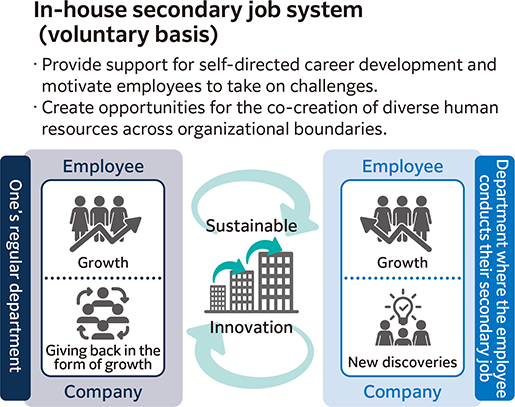We implement various measures in light of achievement management and business strategies as well as supporting diverse human resources that takes on challenges and is eager to grow.

The managerial levels and each organization had discussions on visualizing the gap between the current status and the abilities and skills needed from the perspective of the growth of both the company and individual levels to achieve business strategies. As a result, we defined reskilling as “voluntary learning of knowledge and skills necessary for executing work, whether those are new or existing.”
Specifically, to support the process of individual skill acquisition and development (the figure below), we changed the learning environment in which “some individuals learn a uniform set of skills at a predetermined timing, frequency, and location" to "individuals can learn a wide variety of skills anytime, anywhere, and as often as they want. Based on the above, We introduced a new e-learning system that will enable to offer such learning opportunities across the Company in FY2024. This system provides content that allows individuals to learn diverse skills at any time. We will also help individuals learn voluntarily by aligning various training curricula (by positions, by divisions, and by projects) and providing cross-sectional and cross-organizational learning opportunities.

We started our Global Business Leader (GBL) training in FY2006, and in FY2013, this was reformed into the Global Mindset Program (GMP), with an extra emphasis being placed on global human resource education. We have also operated a Global Development Program (GDP) for overseas local employees since FY2010 with the aim of strengthening links within Furukawa Electric Group, with the curriculum being partly shared with the GMP. Furthermore, in FY2014, we launched the Global Challenge Program (GCP). This program involves the dispatch of younger employees to foreign countries for certain periods of time, allowing us to secure diverse talent and provide opportunities for growth.

We provide training for creating organizations where human resources are developed for all workplaces that accept new employees. This is because we believe that in order to create an organization that can achieve results as a team, it is essential to improve the overall development capabilities of the workplace. For this reason, the training is not only for supervisors, but also for other members of the workplace.
Generally speaking, when we talk about OJT training, we think of cases where the supervisor and section manager are busy providing guidance and follow-up to new employees with the aim of making them into effective members of the workforce. However, our OJT support does not involve supervisors or mentors, but rather appoints an OJT leader to act as an arranger, and the aim is to create an educational system as an organization by having the OJT leader involve all team members in discussions. In addition, we provide opportunities to go through the OJT PDCA cycle over the course of a year in order to build up an educational system as an organization. In the OJT PDCA cycle, we hold four training sessions a year to impart skills and share concerns and best practices among OJT leaders. Since 2021, there has been an increase in cases of mid-career recruitment, and we also provide similar OJT support outside of the workplace that accepts new employees as training to strengthen ability to train and develop people, through an open recruitment system.
The Career Support Office was established in FY2021. With this office, we are making efforts to support employees’ self-directed career development in tandem with existing personnel systems, including career design training provided for each age group and class, seminars to help employees develop their careers, and individual career-related consultation meetings.

Since FY2021, we have been operating an in-house secondary job system. This system allows employees to use up to 20% of their workload to volunteer for participation in projects that interest them and constitutes a mechanism serving to contribute to their own growth, fulfillment, and career development. Since the inception of the system, 112 employees have participated in 48 projects. This system serves as a positive stimulas and impact on both the departments taking on the volunteering employees and the departments sending volunteering employees, along with improving motivation of the volunteering employees themselves.

In order to accelerate the realization of more self-directed careers for our employees, we introduced an internal open recruitment system on a trial basis in FY2023, which allows employees to volunteer for organizational transfers. There were 34 applicants and 10 matches for 57 internal job openings. Based on these results, we have started to introduce this system officially in FY2024.
